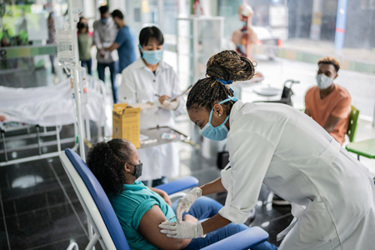Continuous Evidence Generation — Including RWE — Remains Critical To Vaccine Development
By Derek Wallace, president, global vaccine business unit, Takeda

In the world of vaccine development, regulatory approval is only the beginning. The true measure of success lies in ensuring those who can benefit from a vaccine can easily access it, while building public trust in its long-term value, especially as vaccine skepticism and misinformation continue to rise. Ongoing evidence generation is crucial to advance the understanding of a vaccine and the disease it prevents, as well as to evaluate its real-world impact among different populations.
When launching a new vaccine, it’s our responsibility as leaders in research and development to help make sure our products have a sustainable impact. As I look ahead, I’m hopeful for a future where we’re building resilient public health systems that can withstand global health threats. The first step in reaching that lofty goal is learning more — about the diseases we face and the tools we have to fight them.
The Power Of Continuous Evidence Generation
Pre-licensure, clinical trials focus on establishing the safety and efficacy profile of a vaccine in healthy populations. However, diverse populations and the complex dynamics of diseases in different environments require the scope of studies to expand in the post-licensure phase. Today, long-term interventional trials and post-marketing studies are integral parts of the vaccine development process. They provide vital data that not only informs the optimal use of a vaccine but also helps design public programs.
A prime example of this evolution in clinical trial robustness is the development of the first malaria vaccine. The initial clinical trials for this vaccine were among the most extensive ever conducted for a parasitic disease and were instrumental in demonstrating the vaccine's efficacy and safety profile, highlighting the role clinical trials play — in securing regulatory approval, in supporting inclusion in national immunization programs, and, critically, in building public trust. Follow-up real-world studies of this malaria vaccine continued to shape its long-term use. In African countries, studies revealed seasonal administration of the vaccine was more effective than year-round dosing in areas with high seasonal transmission, leading to adapted deployment strategies that improved protection during peak malaria seasons. It’s important to understand and apply these insights to future studies; that's why Takeda’s trial evaluating our dengue vaccine was designed to be the largest, longest, and most geographically diverse interventional study to date for the company, following over 20,000 children in eight countries in Latin America and Asia over four and a half years.
But it doesn't stop there. Continuous data collection also helps ensure vaccines maintain a consistent safety and efficacy profile over time. For example, Takeda will soon share results from over seven years of studying our dengue vaccine, which will shed light on long-term efficacy and safety, marking it as the longest studied dengue vaccine to date. Collecting and analyzing data from post-marketing studies can also help tailor further immunization strategies for diverse populations.
For the vaccine industry, integrating long-term, ongoing evidence generation should be the standard for advancing public health and optimized immunization strategies globally. Without it, we risk repeating historical missteps where a lack of continuous monitoring delayed the mitigation of detrimental or unexpected side effects, which can erode public trust and leave populations vulnerable to preventable diseases.
Harnessing Real-World Evidence (RWE)
It’s also important to study how vaccines perform outside the controlled settings of clinical trials, to gain insight that can influence everything from individual patient care to global health policies. This evidence helps us understand the practical impact of our vaccines in everyday life – such as effectiveness during outbreaks, performance across populations excluded from prelicensure studies (such as those with comorbidities, immunosuppression, or pregnancy), and real-world implementation challenges like incomplete vaccination series or varying storage conditions.
We are already seeing the value of ongoing data collection in dengue-endemic countries through a large study in Thailand, Indonesia, and Malaysia, and a population-based study in Brazil. These studies aim to determine impact, effectiveness, and safety in real-world settings. Examples of what can be learned in such studies include speed of impact of vaccination programs, potential herd effects, and safety in those who don’t complete the two-dose schedule.
The Role Of Health Economics In Vaccine Impact
Health economics also plays a crucial role in the adoption and implementation of vaccines, offering insights into their cost-effectiveness and broader impacts on public health systems. As global trends indicate, the burden of vaccine-preventable diseases is likely to increase in the future due to factors such as population growth, urbanization, and climate change, making our preparedness more critical than ever. According to a study from Bulletin of the World Health Organization, immunization efforts in 73 low- and middle-income countries from 2001 to 2020 are estimated to have saved these countries 350 billion USD in healthcare costs and generated 820 billion USD in wider societal and economic value.
It's clear that ongoing data generation and economic analysis are not just academic exercises; they are crucial for shaping policies and strategies. For example, results from our economic analysis in Thailand showed that integrating dengue vaccination into a national immunization program reduced the burden of dengue while achieving cost savings. Investing in health economics helps develop targeted, cost-effective vaccination programs that can adapt to changing epidemiological landscapes and help build a more resilient public health infrastructure.
Legacy Of Health
To bridge the gaps from clinical trials to global health outcomes, all of us in healthcare and research need to champion ongoing evidence generation efforts. It is important to be fully committed to pioneering approaches in vaccine development that not only bolster trust in science but also effectively serve diverse populations and adapt to our ever-changing climate.
Through continuous innovation, we can ensure that critical vaccines remain consistent, trusted public health tools that are readily accessible to help populations in the face of evolving health challenges.
About The Author:
 Derek Wallace, MBBS, is the president of Takeda’s Vaccine Business Unit, steering the development and global delivery of its dengue vaccine. He has over 17 years in vaccine research, stemming from his time at Merck, Novartis, and Sanofi Pasteur. Derek holds a Bachelor of Medicine and Surgery from The University of Queensland, supplemented by a Diploma of Pharmaceutical Medicine from the Royal College of Physicians, U.K., and a Diploma of Vaccinology from Institut Pasteur, Paris. Derek is an advocate for proactive public health strategies and dengue education to prevent outbreaks. He is also passionate about the interconnections of climate change, urban health, and infectious diseases. Based in Massachusetts, he enjoys gardening and woodworking in his free time.
Derek Wallace, MBBS, is the president of Takeda’s Vaccine Business Unit, steering the development and global delivery of its dengue vaccine. He has over 17 years in vaccine research, stemming from his time at Merck, Novartis, and Sanofi Pasteur. Derek holds a Bachelor of Medicine and Surgery from The University of Queensland, supplemented by a Diploma of Pharmaceutical Medicine from the Royal College of Physicians, U.K., and a Diploma of Vaccinology from Institut Pasteur, Paris. Derek is an advocate for proactive public health strategies and dengue education to prevent outbreaks. He is also passionate about the interconnections of climate change, urban health, and infectious diseases. Based in Massachusetts, he enjoys gardening and woodworking in his free time.
